The Kenyan Government has recently launched a new policy, establishing a visa-free system for international travellers. However, individuals planning to visit Kenya must now secure an Electronic Travel Authorization (ETA) before they arrive in the country. Under this new arrangement, every traveller eligible for entry into Kenya is obliged to apply for an ETA.
Kenya eTA Audio Guide on Long-Term Stay Options and Visa Types

Who is Eligible to Apply for a Kenya eTA?
Travellers eligible for Kenya eTAmust apply for an Electronic Travel Authorization (eTA) before embarking on their trip. In cases involving minors under 18, it is the obligation of their legal guardian, parent, or an adult travelling with them to complete the application on their behalf.
Individuals who hold citizenship in any East African Community (EAC) Partner States are not required to obtain an eTA. The EAC Partner States comprise a group of nations, including the Republic of Burundi, the Democratic Republic of the Congo, the Federal Republic of Somalia, the Republic of Kenya, the Republic of Rwanda, the Republic of South Sudan, the Republic of Uganda, and the United Republic of Tanzania. These countries have an agreement that exempts their citizens from the eTA stipulations.
What are the Requirements to Apply for a Kenya eTA?
Understanding the prerequisites for obtaining a Kenya eTA is essential for eligible travellers planning to visit Kenya. To successfully apply for this electronic travel authorisation, several specific conditions must be met:
- Passport Validity: Travelers must ensure their passport remains valid for at least six months from the planned arrival date in Kenya. This requirement is crucial for the approval of the eTA.
- Passport Biodata Page Photograph: Applicants must provide a clear, legible photograph of the biodata page of their passport. This page contains vital information such as the traveller's full name, passport number, date of birth, and photograph.
- Applicant's Photograph: A recent, clear image of the applicant is also mandatory. This photograph should meet the standard passport photo requirements, including being in colour, having a plain background, and showing the applicant's entire face.
- Accommodation Evidence: Proof of planned accommodation within Kenya, such as hotel bookings, must be provided. This document should clearly state the accommodation facility's name, the stay's duration, and the address.
- Contact Information: Applicants must furnish their contact details, including a current email address and phone number. These details are used for communication regarding the eTA application and any further requirements or updates.
- Payment Methods: The eTA application process includes a fee, which can be paid using various methods such as Apple Pay, credit card, or debit card. Applicants should have access to at least one of these payment options to complete the transaction.
- Additional Documents: Other documents may be required depending on individual circumstances or as requested by the Kenyan authorities. These should be submitted in an acceptable format, which includes PDF, Word, or JPG. It’s essential to ensure that these documents are clear and readable.
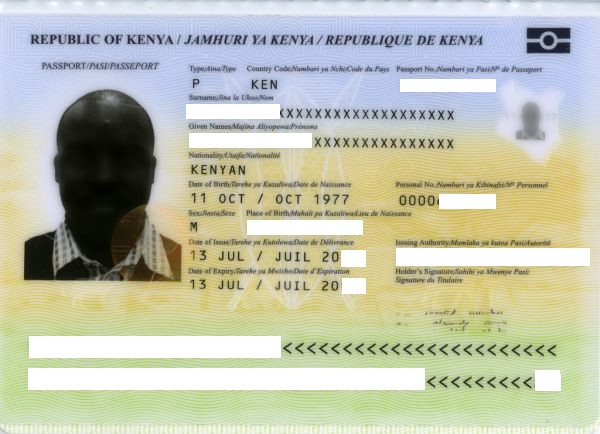
Kenya eTA Photo Requirements
To apply for a Kenya eTA, there are some Kenya eTA photo requirements which the eligible candidates must be aware of like:
- Photo Origin: Candidates are required to provide a photograph that has been professionally taken. Selfies, scanned images, or pictures of existing photos, especially those in passports, are unacceptable.
- Recency of Photo: The photograph should be recent, ideally taken within the last six months. This ensures that the photo reflects the applicant's current physical appearance.
- Clarity and Color: The photograph must be clear, focused, and complete colour. This assists in the accurate identification of the applicant.
- No Alterations or Filters: The photograph must be natural and unaltered. Any form of digital manipulation, including using filters or editing tools to enhance or modify the appearance, is strictly prohibited.
- Condition of the Photograph: The photo must be free from any damage or imperfections that might obscure the applicant's appearance.
- Background Requirements: The photograph's background should be either off-white or plain white. It is essential to avoid any digital modification of the background.
- Face Visibility: The applicant must be fully visible in the photograph. This means no wearing hats, glasses, or head coverings that might obscure any part of the face. However, exceptions are made for individuals who wear head coverings for medical or religious reasons.
- Attire in the Photo: Applicants should wear their usual everyday clothes. Uniforms or costumes, except religious attire, are not acceptable if worn daily.
- Accessories and Aids: Applicants who habitually wear accessories such as prescription glasses, hearing aids, wigs, or similar items are permitted to wear these in the photograph. However, this exemption does not extend to nonprescription glasses with tinted or dark lenses unless these are worn for a medically certified reason, for which a medical certificate might be requested.
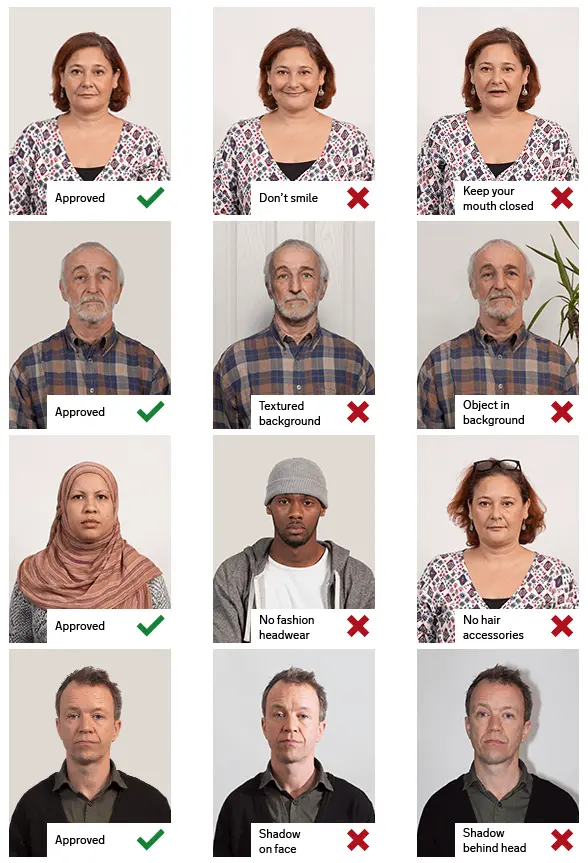
Kenya Entry Requirements for EAC Nationals
Citizens of the East African Community (EAC) member states enjoy a special exemption from the Electronic Travel Authorization (ETA) prerequisites when entering Kenya. Instead of the ETA, these individuals must carry and present their valid passport or an equivalent travel document upon their arrival. This streamlined process facilitates easier access for EAC nationals into Kenya.
In contrast, the validity of Kenya's ETA differs significantly from the ETA systems implemented in countries like Canada or the United States. While ETAs in these nations often remain valid for multiple years, allowing for numerous entries, Kenya's ETA is uniquely designed for single use. Therefore, travellers affected by this policy must apply for a new ETA for every visit they plan to make to Kenya. This distinction is crucial for travellers to note to ensure compliance with Kenyan immigration policies.
Kenya Entry Requirements for Friends/Family Visit eTA
- The individual journeying to Kenya must furnish duplicates of the invitation correspondences received from their host family living in Kenya.
- Additionally, the traveller must possess copies of identification documents about the host.
- These documents include the host's passport, national identification card, Alien Card, or Entry Permit, as applicable.
- This comprehensive submission of documents verifies the host's identity and legal status, thereby facilitating a smoother travel and entry process for the visitor.
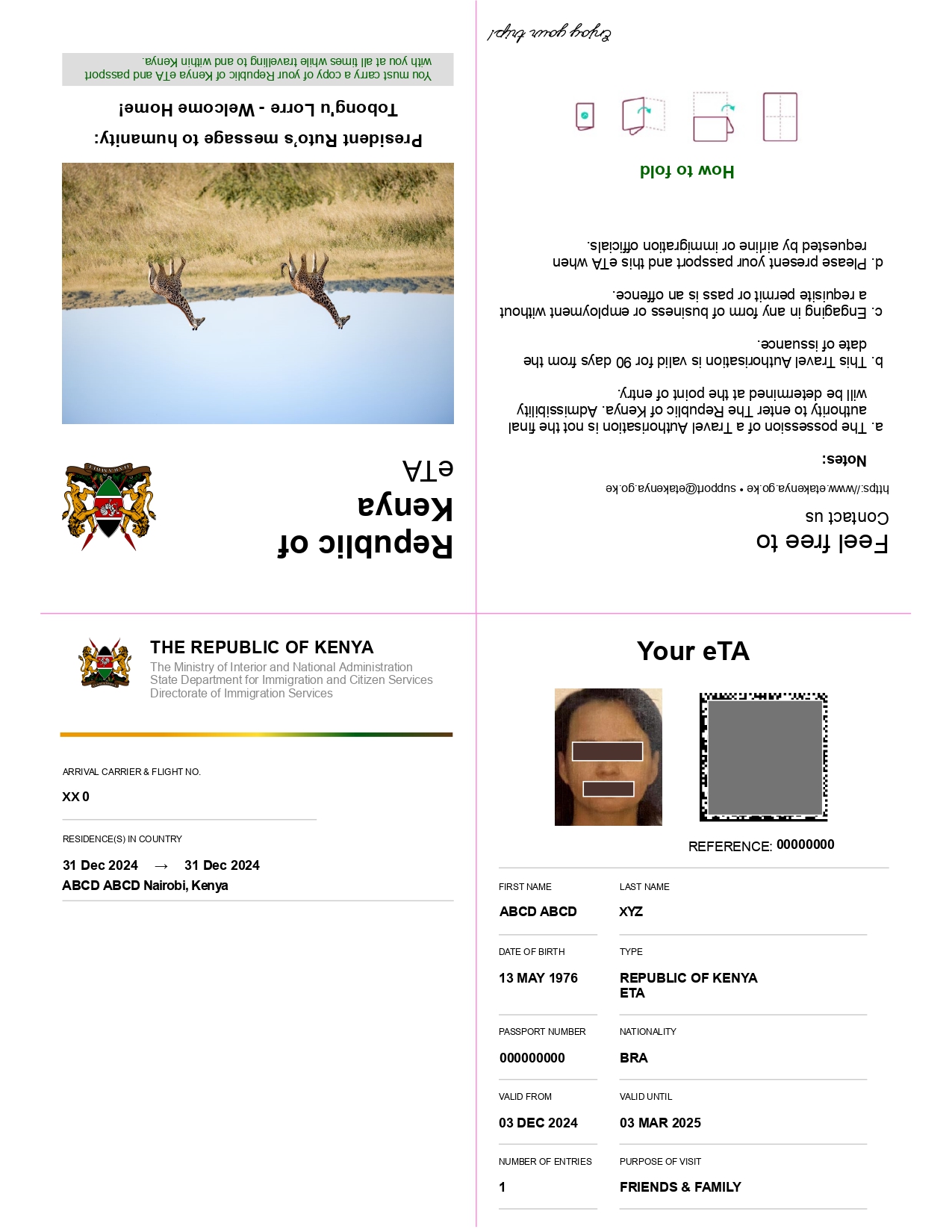
Kenya Entry Requirements for Medical eTA
- A formal document issued by a medical professional or healthcare institution, typically a letter, explicitly states the need for the individual to seek medical attention beyond their home country's borders.
- This document serves as a referral and is an essential part of the patient's medical records.
- It outlines the specific reasons why the patient's condition warrants treatment in a foreign facility, possibly due to the availability of specialised care, advanced technology, or expertise not present locally.
- Furthermore, the patient will also receive a corresponding letter from the receiving healthcare facility or specialist abroad.
- This letter confirms their willingness and preparedness to provide the necessary medical treatment to the traveller upon arrival.
- It includes details about the planned medical procedures or therapies, the anticipated duration of the treatment, and any preparatory steps the patient needs to undertake.
- This documentation is crucial for the patient's journey and treatment plan, ensuring a coordinated and efficient healthcare experience across international borders.
Kenya Entry Requirements for Work/Conference/Business eTA
- Invitation letter from company
- Copy of registration of the company
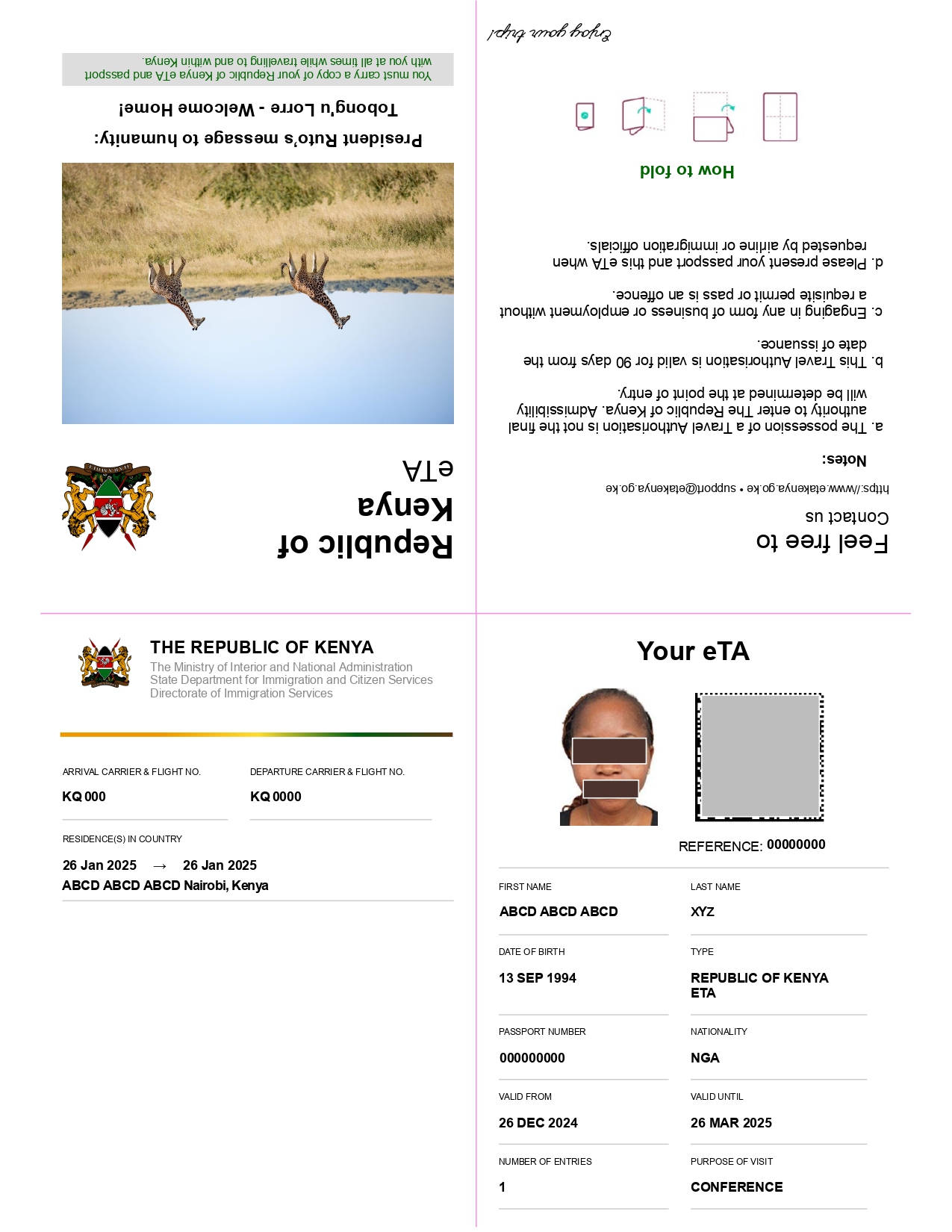
Kenya Entry Requirements for a Diplomatic eTA
- Diplomatic Passport: This is a specialized passport category designated for individuals engaged in diplomatic missions or representatives of their respective governments. It's typically issued to ambassadors and consuls.
- Official Passport: Intended for government employees travelling for official state business but do not qualify for diplomatic status. This includes various civil servants on official duty.
- Service Passport: This passport is issued to government staff and employees dispatched abroad on public service assignments but is not included in the diplomatic or official service categories.
Mandatory Documentation for Application:
An applicant must furnish an official communication from one of the following authorities:
- The Country of Origin: A formal letter or document issued by the applicant's home country, validating their identity and the purpose of travel. A competent authority in the country of origin should authorise this document.
- The Relevant Organisation: A certified document from the organisation is required for those affiliated with international organisations or entities. This should detail the nature of the applicant's visit and their role in the organisation.
- The Ministry of Foreign Affairs or Its Equivalent: This involves obtaining a letter from the Ministry of Foreign Affairs or an analogous department. The letter should endorse the individual's travel and affirm their trip's official or diplomatic nature.
Kenya eTA Application Form Filling Process
To secure a Kenyan electronic Travel Authorization (eTA), individuals from eligible countries can conveniently initiate the process through an online application. Here's a more detailed guide to assist you in navigating the application procedure:
- Choosing the Appropriate eTA Category: Upon entering the portal, you must select the type of eTA that aligns with your purpose of travelling to Kenya. This might include options like a tourist eTA, business eTA, or transit eTA, each tailored to different visitation needs.
- Filling Out the Application Form: The next crucial step involves accurately completing the Kenyan eTA Application Form. Ensure that all information provided is both accurate and comprehensive. This includes personal details, travel information, and other required data for your visit.
- Payment of Application Fee: After completing the form, you'll proceed to the payment section. Here, you can pay the necessary application fee using various online payment methods, including credit cards, among other digital payment options.
- Tracking the Application Progress: Post-payment, you will receive updates regarding the status of your eTA application. These updates keep you informed about the processing stages of your application and any further actions that may be required from your end.
- Receiving and Utilizing the eTA: Finally, upon the approval of your eTA, you will receive an email confirmation. This email typically contains a link or an attachment for downloading your eTA. It's advised that you print out this document, as you must present it to the border authorities upon your arrival in Kenya.
Kenya Tourism eTA Visa Sample
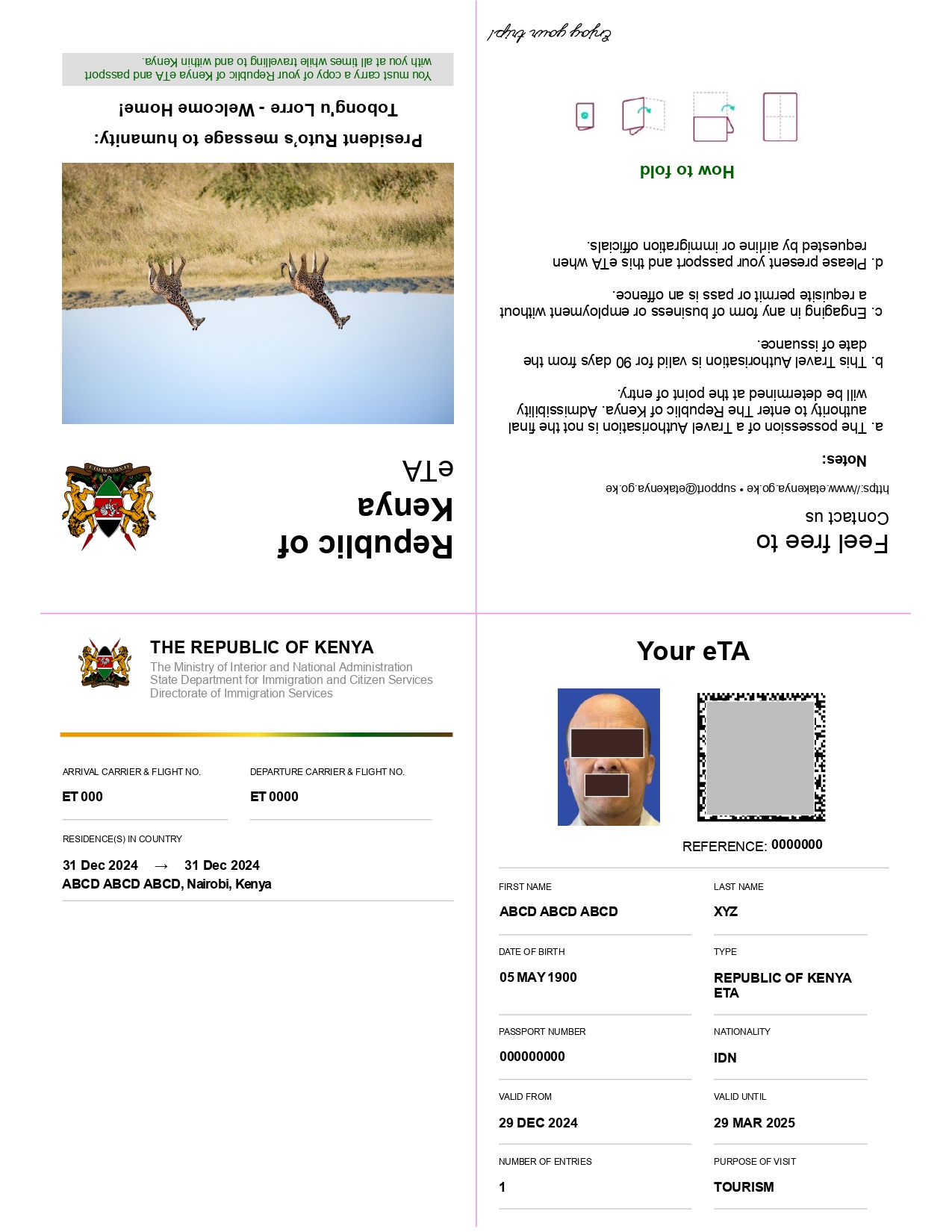
FAQs
A Kenya eTA, or Electronic Travel Authorization, is an official travel document that allows foreign nationals to enter Kenya for short visits, such as tourism, business, or transit. It is a mandatory requirement for travellers from countries eligible for eTA issuance. It streamlines the entry process and enhances security by pre-screening visitors before their arrival.
Citizens of numerous countries are eligible for a Kenya eTA, including but not limited to the United States, Canada, the United Kingdom, Australia, and most European Union member states. The list of eligible countries may change, so checking the latest information from the Kenyan government or their official website is essential.
To apply for a Kenya eTA, you can visit the official Kenyan eVisa website. You'll need to fill out an online application form, provide personal and travel information, upload necessary documents, and pay the processing fee using a credit or debit card. After submission, you'll receive an email confirmation, and your eTA will be processed and sent to you electronically.
The documents required may vary based on your nationality and the purpose of your visit. However, commonly requested documents include a valid passport with at least six months of validity from entry into Kenya, a recent passport-sized photograph, and proof of your travel itinerary, such as flight bookings and accommodation reservations.
The processing time for a Kenya eTA application is usually quick, with most applications being approved within two to three business days. However, applying well before your intended travel date is advisable to allow for any unexpected delays.
A Kenya eTA is typically valid for 90 days from the issue date. This means you must enter Kenya within this timeframe. Once you enter Kenya, you can stay for a maximum of 90 days. It's important to note that a Kenya eTA is for single entry only, so if you leave Kenya during your visit, you will need to apply for a new eTA to re-enter.
Extending your stay in Kenya beyond the 90 days permitted with an eTA may be possible, but it typically involves a complex process. You should contact the Kenyan immigration authorities well before your eTA's expiry date to explore your options and understand the requirements for an extension.
No, a Kenya eTA is not the same as a traditional visa. While both allow foreign nationals to enter Kenya, an eTA is an electronic authorisation, while a visa is a physical sticker or stamp in your passport. The application process, requirements, and validity period differ between the two.
No, a Kenya eTA is valid for a single entry only. If you plan to leave Kenya and return later, you must apply for a new eTA before your next entry.
The cost of a Kenya eTA can vary depending on your nationality and the purpose of your visit. It is advisable to check the official Kenyan eVisa website for the most up-to-date fee information. The fee is usually paid online at the time of application and is non-refundable.
No, possessing a Kenya eTA does not guarantee entry into Kenya. The immigration authorities at the port of entry have the final discretion to grant or deny entry based on various factors, including your eligibility, travel documents, and the purpose of your visit. It's essential to meet all entry requirements and carry all necessary documents.
Applying for a Kenya eTA upon arrival in Kenya is not possible. You must obtain your eTA through the official online application process before your trip. Attempting to enter Kenya without a valid eTA may result in a denial of entry.
Once you have submitted your Kenya eTA application, it is challenging to make changes. It's crucial to review all information carefully before submission to avoid errors. If you need to make corrections or updates, you may need to contact the Kenyan immigration authorities for guidance.
Yes, regardless of age, children need their separate Kenya eTA if they travel with you. Each traveller must have their eTA, including infants and minors. Parents or guardians can complete the application on behalf of their children.
If your Kenya eTA application is denied, you should carefully review the rejection letter to understand why. You can reapply with corrected or additional information or consider applying for a traditional visa through the Kenyan embassy or consulate in your country.

To help us improve